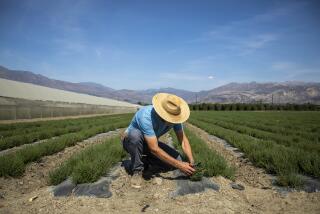Going Organic Helps Plants -- and Society
- Share via
Organic gardening is becoming very popular. Just what is it?
The underlying philosophy is to promote the health of the soil. The organic gardening movement can be traced to the work of Albert Howard, an English agricultural scientist who studied the relationship between soil, plant, livestock and human health.
Howard, who was eventually knighted for his work, showed that organic matter is the backbone of healthy soil. Organic matter is a catchall term for what is or was (in various states of decomposition) living. The ultimate source of organic matter is plant residues, in such forms as old plants left to rot in the soil, hay mulch and pre-processed residues such as manure and compost. Look upon organic matter as the roughage in a plant’s diet.
The organic gardener feeds the soil. As soil organisms “chew” up such organic fertilizers as compost, cow manure or soybean meal, nutrients are released for plant use.
Organic fertilizers eventually are broken down to compounds that are essentially the same as chemical fertilizers. But breakdown of organic fertilizers by soil microbes depends on moisture and temperature--the same things that affect plant growth. So plants get food in sync with their needs, and there is less chance of fertilizer washing away, being wasted or causing pollution.
Plants in the organic garden also benefit from the mixed diet offered. Fertilizers like compost, seawood and pulverized rock supply the dozen or so soil nutrients required for plant growth.
On the other hand, giving your garden a handful of chemical 10-10-10 fertilizer feeds plants only nitrogen, phosphorus and potassium, and perhaps one or two other essential nutrients.
As for pest problems, organic gardeners shun the arsenal of chemical pesticides available.
One particular benefit of gardening organically is it makes you look closely and frequently at your plants. As an old saying goes: “The best fertilizer is the shadow of the gardener.”






